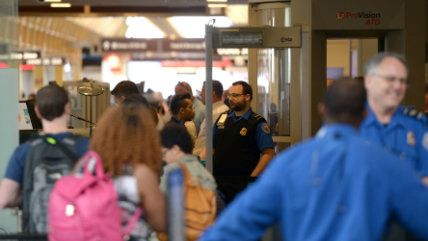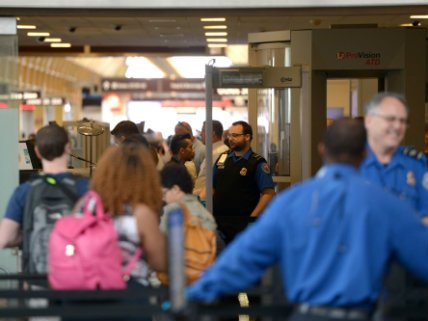DHS Agents Tried to Seize Wall Street Journal Reporter's Phones
Under broad carve-outs to the Fourth Amendment, the government can confiscate and search electronics at the border with or without suspicion.


A Wall Street Journal reporter says Department of Homeland Security agents tried to confiscate her cell phones, even though they knew she was a journalist, after she disembarked from a flight at Los Angeles International Airport last week.
Maria Abi-Habib, a Mideast reporter for the Wall Street Journal, wrote in a Facebook post Thursday that she was going through customs and immigrations when she was approached by a DHS agent who said she wanted to "help you get through the line." But instead, she was ushered into a room and interrogated for an hour before the DHS agents tried, unsuccesfully, to get her to turn over her cell phones.
"We are disturbed by the serious incident involving WSJ reporter Maria Abi-Habib, a citizen of the United States and Lebanon," Wall Street Journal editor-in-chief Gerard Baker said in a statement. "We have been working to learn more about these events, but the notion that Customs and Border Protection agents would stop and question one of our journalists in connection with her reporting and seek to search her cell phones is unacceptable."
From Ali-Habib's Facebook post:
[S]he took me to a special section of LAX airport. Another customs agent joined her at that point and they grilled me for an hour—asking me about the years I lived in the US, when I moved to Beirut and why, who lives at my in-laws' house in LA and numbers for the groom and bride whose wedding I was attending. I answered jovially, because I've had enough high-level security experiences to know that being annoyed or hostile will work against you.
But then she asked me for my two cellphones. I asked her what she wanted from them.
"We want to collect information" she said, refusing to specify what kind.
And that is where I drew the line—I told her I had First Amendment rights as a journalist she couldn't violate and I was protected under. I explained I had to protect my government and military sources—over the last month, I have broken two stories that deeply irked the US government, in addition to other stories before I went on maternity leave, including one in Kabul that sparked a Congressional investigation into US military corruption, all stories leaked by American officials speaking to me in confidence.
"Did you just admit you collect information for foreign governments?" she asked, her tone turning hostile.
"No, that's exactly not what I just said," I replied, explaining again why I would not hand over my phones.
She handed me a DHS document, a photo of which I've attached. It basically says the US government has the right to seize my phones and my rights as a US citizen (or citizen of the world) go out the window. This law applies at any point of entry into the US, whether naval, air or land and extends for 100 miles into the US from the border or formal points of entry. So, all of NY city for instance. If they forgot to ask you at JFK airport for your phones, but you're having a drink in Manhattan the next day, you technically fall under this authority. And because they are acting under the pretense to protect the US from terrorism, you have to give it up.
Which is all true! As the Electronic Frontier Foundation helpfully explains, customs and immigration agents can confiscate and search a U.S. citizen's personal electronics within 100 miles of a point of entry "with or without individualized suspicion." Last year, the EFF filed an amicus brief urging the 4th Circuit Court of Appeals to rule that government agents require a warrant when searching electronic devices at the border.
The Committee to Protect Journalists wrote in 2014 that the broad carve-outs to the Fourth Amendment for border searches have resulted in numerous journalists being detained and having their electronics pored over by government agents.
Abi-Habib, however, was having none of it and told the agents to call the Wall Street Journal's formidable team of lawyers. After accusing Abi-Habib of hindering their investigation, one of the DHS agents left for half an hour to speak with a supervisor. When she returned, the agent told Abi-Habib she was free to go.
"I have no idea why they wanted my phones," Abi-Habib wrote. "It could have been a way for them to download my contacts. Or maybe they expect me of terrorism or sympathizing with terrorists—although my profile wouldn't fit, considering I am named Maria Teresa, and for a variety of other reasons including my small child."
The Department of Homeland Security did not immediately return a request for comment.


Show Comments (196)